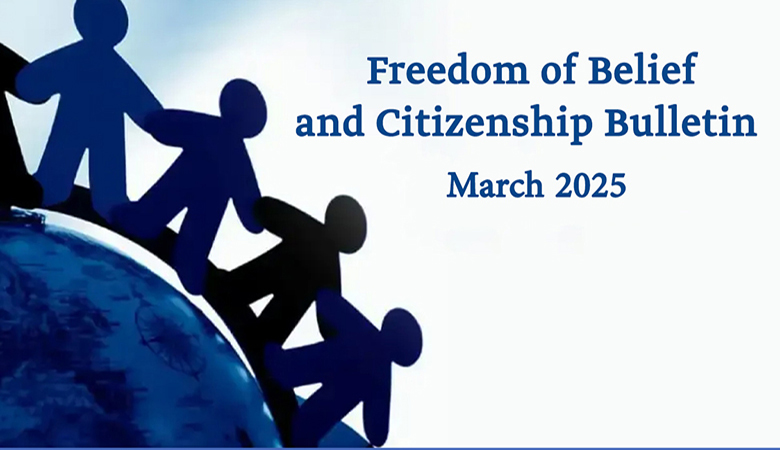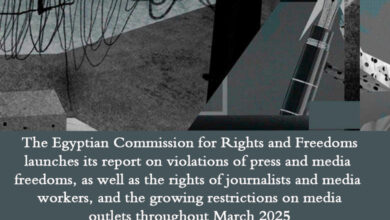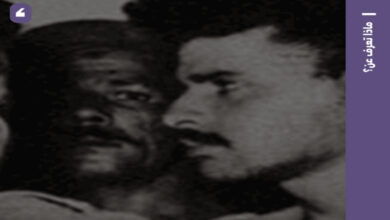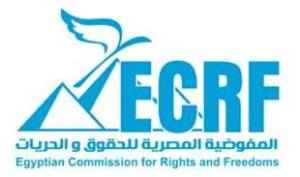Freedom of Belief and Citizenship Bulletin March 2025

The Egyptian Commission for Rights and Freedoms (ECRF) launches its special bulletin on “Freedom of Belief and Citizenship” to address the concerns and challenges faced by minorities, promote a culture of tolerance, reject violence and hate speech, and reinforce the values of citizenship. In this bulletin, the Commission highlights the most significant developments and violations related to freedom of belief and citizenship during March 2025.
The right to equality and non-discrimination is one of the most fundamental human rights. Article 1 of the Universal Declaration of Human Rights (UDHR) states that:
“All human beings are born free and equal in dignity and rights.”
Article 2 of the UDHR affirms that:
“Everyone is entitled to all the rights and freedoms set forth in this Declaration, without distinction of any kind, such as race, color, sex, language, religion, political or other opinion, national or social origin, property, birth, or other status.”
Additionally, Article 7 of the UDHR states:
“All are equal before the law and are entitled without any discrimination to equal protection of the law. All are entitled to equal protection against any discrimination in violation of this Declaration and against any incitement to such discrimination.”
Moreover, Article 4 of the International Convention on the Elimination of All Forms of Racial Discrimination (ICERD) prohibits hate speech, stating that:
“State Parties shall condemn all propaganda and organizations which are based on ideas or theories of superiority of one race or group of persons of one color or ethnic origin, or which attempt to justify or promote racial hatred and discrimination in any form.”
The organization ARTICLE 19, which researches and advocates freedom of expression in accordance with the UDHR, defines incitement as:
“A direct or indirect public call for action against individuals or groups, using any form of public communication, where the speech is directed against specific individuals or groups, even indirectly, such as through metaphors and figurative language.”
Ignoring hate speech against a particular group based on race, belief, or gender without deterrence obstructs peace, threatens stability and development, and undermines human dignity.
Below are the most notable developments and violations in the “Freedom of Belief and Citizenship” file during March 2025.
Freedom of Belief and Citizenship News
-On March 1, 2025, Dr. Ahmed Al-Tayeb, Grand Imam of Al-Azhar and Chairman of the Muslim Council of Elders, unveiled Al-Azhar’s strategy for building bridges of coexistence. This initiative began with the establishment of the “Egyptian Family House” in 2011, following the tragic attack on the Saints Church in Alexandria. He noted that the leadership of this initiative alternates every six months between the Grand Imam of Al-Azhar and the Pope of the Coptic Orthodox Church. The structure of the initiative was carefully designed to avoid any indication of religious discrimination or division.
During his Ramadan program, Al-Imam Al-Tayyib, the Grand Imam stated that, following the success of the Egyptian Family House domestically as a pioneering and inspiring experience, efforts were made to foster peace among different sects within the Islamic and Arab worlds. This led to the idea of creating a scholarly unity as a starting point, aiming to establish a shared vision and common goal among religious scholars. He explained:
“From this perspective, we thought of convening scholars from different Islamic sects, engaging in discussions, and ensuring that our countries remain open to scholars.”
Al-Tayeb emphasized the great success of the Islamic-Islamic Dialogue Conference held in Bahrain and expressed deep appreciation to King Hamad bin Isa Al Khalifa of Bahrain for hosting this event. The conference brought together representatives from various Islamic sects—including Sunnis, Twelver Shiites, Ibadis, and Zaydis—from over 30 countries. Attendees experienced an atmosphere of fraternity, friendship, and open dialogue.
The conference resulted in significant recommendations and addressed the root causes of sectarian division and doctrinal fanaticism. Al-Tayeb remarked:
“We accept sectarian diversity—it is inevitable—but we reject sectarian fanaticism. Everyone must embrace the principle of unity in confronting common adversaries.”
The Grand Imam stressed the need to prioritize the greater interests of Muslims over sectarian disputes, emphasizing that difference is a divine law, as indicated in the Quranic verse:
“And they will not cease to differ” (Hud 118).
However, he warned that disagreement should not escalate into fanaticism that weakens the ummah (nation). He argued that sectarian loyalty should not outweigh the duty to preserve unity and safeguard the nation, adding:
“The ummah must stand united in times of crisis, just like other global alliances—such as the European Union—do. We have far more commonalities that justify unity than they do.”
-On March 2, 2025, writer Fatima Al-Maadoul asserted that despite Egypt being a Sunni-majority country, it has historically maintained love for Ahl al-Bayt (the Prophet’s family) and reverence for the Companions of the Prophet, even those who were involved in historical conflicts. She highlighted that Egyptians have an inherently tolerant and conciliatory nature, which shapes their stance on contentious historical issues.
Al-Maadoul pointed out that many people are unaware that Egypt was a Shiite state until the arrival of Salah al-Din al-Ayyubi (Saladin), who closed Al-Azhar University and transformed it into a Sunni institution, whereas it had previously been a center for Shiite thought. She noted that the cinematic portrayal of Saladin differs significantly from his historical reality.
In a social media post on Facebook, she wrote:
“‘We are Sunnis, but our hearts lean toward Shiism’—a phrase my mother always repeated when I was a child. And of course, few people know that Egypt was Shiite until Saladin arrived and killed 92,000 Egyptians, especially in Upper Egypt! He shut down Al-Azhar, which was then Shiite, and it remained closed for 100 years even after his death!”
She continued: “Saladin, as portrayed by Ahmed Mazhar in cinema—so charming and tolerant! But was his victory truly overwhelming, or was it more like a limited success followed by agreements, much like Sadat’s style? The movie Al-Nasir Salah al-Din is filled with historical fabrications, yet we watch it and admire a version of Saladin that isn’t even real! Just as we watch the great actor Hamdi Gheith playing Richard the Lionheart—who was nothing like him!”
Regarding the controversy surrounding the historical series Muawiyah, she commented:
“So, what if they made a historical series about Muawiyah? Just let it go! We’ll watch it and move on! So, what if Muawiyah was overweight at 130 kg, but they cast a slim and handsome actor? Maybe he lost weight during the filming! And why should it matter if the series presents a perspective that doesn’t, please the Shiites or those who love Ahl al-Bayt? It’s not our concern!”
She concluded her post by praising Egyptians’ historical tolerance and inclusivity, saying:
“We, Egyptians, have no problem with any of this. May God keep problems away from us! We already have enough real challenges! Egypt is Sunni but loves all Ahl al-Bayt and reveres all the Companions—even those who fought each other! Isn’t that a beautiful, tolerant, and reconciliatory spirit? Egyptians just want to keep everyone happy! My dear Egyptians, good morning to our beloved, wise, and peaceful Egypt!”.
-On March 12, 2025, Pope Tawadros II, Pope of Alexandria and Patriarch of the See of St. Mark, expressed his solidarity with the statement issued by the Patriarchs of Syria regarding the ongoing events in the country. He called on officials in Syria and across the world to work towards halting the spread of hatred.
Pope Tawadros II warned of the grave danger of violating the sanctity of human life, societies, and nations, affirming that he prays for the suffering and the victims.
The Pope stated:
“We are deeply pained by what is happening in Syria—the severe circumstances, the disturbing scenes, and the distressing news. We join our voices with those of the Patriarchs, sharing in their prayers, and we call for wisdom and discernment among all responsible leaders.”
He added:
“What we have seen, heard, and read stems primarily from hatred. Therefore, I urge leaders at all levels, everywhere, to fight hatred—whether among children, adults, youth, families, or entire nations.”
The Pope reiterated his message, emphasizing:
“Hatred leads to hell, and there is no other path to it but hatred—whether it manifests as cruelty, a lack of mercy, or assaults on the sanctity of human life, society, and the unity of nations.”
He warned:
“Minorities are human beings created by God! Just as it was said of Abel when he was killed by his brother Cain—that his blood cries out—so too does the blood of every innocent person cry out before God.”
He concluded:
“We stand in solidarity with the suffering, the wounded, the victims, and the afflicted. We pray that God grants them inner peace and reassures them that He will bring justice for them at the right time.”
-On March 15, 2025, His Eminence Dr. Ahmed Al-Tayeb, Grand Imam of Al-Azhar and Chairman of the Muslim Council of Elders, emphasized that interfaith and intercultural dialogue is no longer a luxury but an existential necessity to save humanity from ignorance and misunderstanding. He stressed the importance of uniting efforts to build bridges of understanding in place of ignorance, arrogance, and hatred.
His remarks were delivered in a statement read by Ambassador Osama Abdel Khalek, Egypt’s Permanent Representative to the United Nations in New York, during the UN General Assembly session commemorating the International Day to Combat Islamophobia.
The Grand Imam stated that the gathering marked the culmination of commendable efforts by the Organization of Islamic Cooperation (OIC) countries at the UN to address Islamophobia—an irrational phenomenon that now poses a genuine threat to global peace. He described Islamophobia as nothing more than a product of ignorance about the true, tolerant nature of Islam, as well as deliberate attempts to distort its principles, which are based on peaceful coexistence and mutual respect.
He condemned Islamophobia as one of the greatest falsehoods of contemporary history, driven by misinterpretations and the manipulative exploitation of heinous acts committed by extremist groups that are entirely disconnected from Islam.
The statement also highlighted the Al-Azhar Observatory for Combating Extremism, established to clarify Islamic teachings for both Muslims and non-Muslims worldwide. The Observatory works to counteract extremist ideologies, terrorist organizations, and acts of violence against Muslims.
The Grand Imam called for:
An internationally recognized definition of Islamophobia
Comprehensive, up-to-date databases documenting racial and religious crimes against Muslims
A monitoring and evaluation mechanism to assess the effectiveness of initiatives aimed at combating Islamophobia
Additionally, the statement referenced the historic Document on Human Fraternity, signed by the Grand Imam and Pope Francis in Abu Dhabi in 2019, as a significant step toward fostering interfaith harmony.
He urged the global community to combat hate speech, which spreads through social media, mass media, and daily rhetoric, and called for:
Legally binding legislation
Awareness campaigns that promote tolerance and mutual respect
Efforts to cultivate a discourse that restores bonds of understanding and solidarity among nations
The Grand Imam also expressed appreciation for UN Secretary-General António Guterres, commending his fair and courageous stance on Islam and his deep knowledge of its true teachings. He acknowledged Guterres’ efforts to challenge stereotypes and counter the populist rhetoric of far-right groups, who exploit Islamophobia for narrow political gains.
-On March 16, 2025, a Muslim teacher named Jarrah Ramadan Mohamed, a senior geography instructor at Oulad Ali Secondary School for Girls in Sohag, revealed that he had been threatened and pressured by the school principal after exposing a violation related to the prohibition of teaching Christian religion classes to students.
The teacher recounted how he confronted the principal, who had been deliberately preventing Christian students from receiving religious education, even though it was an official part of the curriculum. Upon discovering that students had not received any Christian religion lessons, he publicly voiced his concerns, leading to escalating tensions with the principal.
According to Jarrah Ramadan, the principal not only refused to allocate the designated time for Christian religious classes but also deliberately disrupted the school’s educational process. In some cases, students were even forced into unofficial tutoring sessions, depriving them of their rightful lessons. Additionally, several students filed complaints about the principal’s actions, citing a lack of available classrooms for Christian religion classes.
Following his public disclosure, the principal directly threatened him, warning of job termination and severe consequences within the school. The teacher has since appealed to the Minister of Interior and the Public Prosecutor, urging swift intervention to protect his rights and ensure that Christian religion lessons continue to be taught in public schools.
The incident sparked widespread reactions on social media, with many citizens expressing outrage and calling for equal religious education rights in schools. While numerous users voiced their support for the teacher, others demanded strict legal action against the violations that occurred at the school.
-On March 19, 2025, Dr. Reverend Andrea Zaki, President of the Evangelical Community in Egypt, met with Grand Imam Dr. Ahmed Al-Tayeb, Sheikh of Al-Azhar, in the presence of a high-level delegation from Egypt’s Evangelical leadership, along with several senior officials from Al-Azhar.
During the meeting, Dr. Andrea Zaki expressed his deep appreciation for the Grand Imam, praising his pioneering role in promoting tolerance and peace. He emphasized that:
“Sheikh Al-Tayeb is a global religious leader and an essential figure for Egypt and its people. His efforts significantly contribute to social stability and harmony.”
He further highlighted the Grand Imam’s major role in fostering interfaith coexistence and strengthening universal human values. According to Dr. Zaki, Sheikh Al-Tayeb is one of the most influential religious leaders worldwide, whose contributions to brotherhood, stability, and interfaith dialogue have gained international recognition.
The discussion also touched on the Document on Human Fraternity, signed by Sheikh Al-Tayeb and Pope Francis in Abu Dhabi in 2019. Dr. Zaki described the document as one of the most crucial texts fostering interfaith and intercultural understanding, outlining fundamental rights and a roadmap for coexistence. He noted that over 100 seminars and conferences had been held by the Evangelical community, attended by dozens of pastors and preachers, to promote its principles and reinforce love and unity within society.
In response, Grand Imam Ahmed Al-Tayeb welcomed the Evangelical delegation, expressing his appreciation for the spirit of love and cooperation between Al-Azhar and the Evangelical community in Egypt.
During the meeting, both parties discussed the possibility of integrating the Document on Human Fraternity into educational curricula across Arab ministries of education and cultural institutions. Dr. Zaki and his delegation suggested including the document in the school syllabi in a simplified manner, appropriate for different age groups. Sheikh Al-Tayeb welcomed the proposal, affirming that:
“This document is primarily an ethical charter, and we are fully prepared to support its dissemination and translation into practical initiatives that people can experience in their daily lives.”
-On March 24, 2025, Bishop Paula, Metropolitan of Tanta and the Coptic Orthodox Church’s official on personal status affairs, announced that the new personal status law for Christians in Egypt sets the legal age of adulthood at under 21 years old, as opposed to 18 years old, which is the standard in civil laws.
In a media statement, Bishop Paula explained that the law mandates that brides must be at least 18 years old at the time of engagement. This prevents child engagements and ensures that couples mature psychologically and socially before marriage, ultimately fostering stable Christian marriages.
He emphasized that the new amendment aligns with the Church’s commitment to family protection, ensuring that young couples enter marriage with the necessary emotional and social readiness.
On the topic of religious conversion to circumvent personal status laws, Bishop Paula firmly stated that:
“The Egyptian constitution explicitly allows Christians to follow their own religious laws in matters of personal status. Therefore, Islamic law cannot be applied to these cases.”
He further explained that some individuals had previously exploited religious conversion as a loophole to bypass Christian personal status laws, describing this as an unconstitutional practice. For this reason, the Church has now officially abolished the practice of changing one’s religious affiliation to manipulate legal rulings.
Under the Microscope
-March 4, 2025 – MP Amira Saber, Secretary of the Foreign Relations Committee and Vice President of the Egyptian Social Democratic Party, submitted an urgent inquiry to the Prime Minister and Minister of Education regarding the escalating crisis in basic education. The crisis is marked by declining enrollment rates and rising dropout rates, posing a significant threat to the future of younger generations and sustainable development in Egypt.
According to estimates cited by MP Saber, student enrollment rates have dropped by 85% over the past five years, while approximately 82,000 students drop out annually, based on data from the Central Agency for Public Mobilization and Statistics (CAPMAS) and the Ministry of Education. She attributed these alarming figures to severe economic and social challenges, which limit families’ ability to afford education, thereby widening the educational opportunity gap.
The MP emphasized the urgent need for action to tackle this issue, particularly considering the government’s commitment to improving education, as outlined in the “Key Strategic Directions for Egypt’s New Presidential Term” document. She warned that if dropout rates continue to rise, it could undermine the country’s two-decade-long efforts to develop its education system.
MP Saber called for the referral of her inquiry to the relevant parliamentary committee for discussion and the implementation of necessary measures to uphold Egypt’s constitutional right to education, ensuring that future generations can actively contribute to economic and social development.
-March 5, 2025 – The Egyptian Cabinet approved a draft law regulating the issuance of Islamic fatwas (religious rulings), proposed by the Ministry of Endowments. The law aims to clarify the authority on religious rulings while allowing for religious guidance and scholarly interpretations in academic research.
Under the draft law, the authority to issue public fatwas on general societal matters is exclusively granted to:
The Council of Senior Scholars at Al-Azhar
Dar Al-Iftaa (Egypt’s official Islamic legal body)
Meanwhile, private fatwas, which address individual-specific religious issues, can only be issued by:
The Council of Senior Scholars at Al-Azhar
The Islamic Research Academy
Dar Al-Iftaa
Fatwa Committees within the Ministry of Endowments
Article (4) of the law mandates the creation of official fatwa committees within the Ministry of Endowments, specifying eligibility criteria and operational guidelines for those issuing fatwas. In cases of conflicting fatwas, the Council of Senior Scholars at Al-Azhar will have the final say.
The draft law also distinguishes between religious guidance and formal fatwa issuance, allowing Al-Azhar scholars, preachers, and licensed specialists from the Ministry of Endowments to provide general religious counseling without it being considered an official fatwa.
Additionally, the law imposes strict regulations on media platforms, requiring that all published or broadcasted fatwas must come from qualified and authorized sources. TV programs, media outlets, and online platforms hosting fatwa discussions must ensure that their guests are officially recognized religious scholars.
The law outlines penalties for anyone violating its provisions, particularly regarding unauthorized individuals issuing fatwas or media platforms failing to comply with these guidelines.
-March 7, 2025 – Naguib Gabriel, head of the Egyptian Union for Human Rights, commented on the return of Marina Khalaf, a missing Christian college student from Sohag to her family.
In a phone interview on “Sabah Me”, a program aired by the Coptic Orthodox Channel Me Sat, Gabriel alleged the existence of well-funded campaigns aimed at converting Christian girls to Islam.
He stated:
“How do I know this? Because I have seen multiple cases where girls return to their families after one, two, or even six months of ‘conversion’ to Islam.”
He further claimed that certain groups finance lawyers who take these girls to Al-Azhar for conversion, noting that:
“Overnight, a girl is declared a Muslim without proper verification of whether she has studied Islam, understood its rituals, or comprehended its beliefs.”
Gabriel urged authorities to investigate these alleged coercive tactics and ensure that religious conversions occur based on informed and voluntary decisions.
-March 17, 2025 – Government Spokesperson Mohamed El-Homsani announced that the Egyptian government is conducting a nationwide assessment of the number of foreign residents and refugees to evaluate the financial burden on the state.
In a phone interview with Extra News, El-Homsani explained that the initiative aims to:
Quantify the economic costs associated with hosting migrants and refugees.
Assess the impact of these costs on Egypt’s developmental plans and alternative budget allocations.
Improve data-driven decision-making for national economic and social policies.
He emphasized that understanding the financial implications of supporting foreign residents is crucial for shaping Egypt’s long-term investment strategies and public spending priorities.
-March 27, 2025 – Twenty students from the Public Relations and Advertising Department at Cairo University’s Faculty of Mass Communication launched their graduation project, titled “On the Same Line”, to promote the integration of people with visual and motor disabilities into Egyptian society.
The campaign aims to:
Correct misconceptions about disabilities and highlight the capabilities of people with disabilities.
Advocate for their inclusion in higher education and the job market.
Encourage businesses and educational institutions to adopt inclusive policies.
The students stressed that creating an inclusive environment is essential for ensuring equal opportunities for all, particularly in education, employment, and social life.
The initiative aligns with Egypt’s national efforts to empower people with disabilities, reinforcing their right to equal participation in all aspects of society. The project also seeks to break stereotypes and highlight the valuable contributions of individuals with disabilities.
Additionally, the campaign incorporates digital accessibility initiatives, promoting the use of modern technology to facilitate tasks for people with disabilities in workplaces and educational institutions.
As part of their outreach efforts, the students launched their first awareness event at Saint Mary School, under the sponsorship of Ambassadors for Volunteer Work Foundation. The event aimed to educate high school students on the importance of integrating people with disabilities into universities and the workforce while providing practical guidelines on appropriate interaction.
More campaign activities are scheduled to take place in the coming weeks.
Violence Based on Belief and Hate Speech:
-March 6, 2025: Businessman Naguib Sawiris responded to a social media follower who had wished harm upon businessman Ashraf El-Saad following news of his sudden health crisis. The follower posted, “Ashraf El-Saad has suffered a heart attack. Pray for him… May God take him,” to which Sawiris replied, “Shame on you, may God heal him, God willing.”
-March 7, 2025: Islamic preacher Dr. Mohamed Ali reiterated his controversial statement directed at actress Fifi Abdo, asserting that “God will not accept Hajj or Umrah performed with money earned from dancing.” He defended his stance in an interview, citing Quranic and prophetic evidence that “only lawful earnings should be used for religious obligations.”
-March 11, 2025: A viral video showed a religious scholar criticizing actor Mohamed Ramadan’s new Ramadan TV show, calling it misleading. In response, Ramadan posted on Facebook, “I thought you were talking about the Antichrist! I am Egyptian, and my name is Mohamed Ramadan. We share the same faith and homeland—why all this hatred and slander in the holy month of Ramadan?”
-March 14, 2025: Advertising director Fadwa Mawahib faced criticism for sharing images of the Grand Egyptian Museum with Quranic verses referencing Pharaoh. Some social media users called for legal action against her, while others accused her of disrespecting Egyptian heritage.
-March 17, 2025: Following the death of Salafi preacher Abu Ishaq Al-Huwaini, his son Hatem Al-Huwaini announced his passing online. A fierce debate erupted between Hatem and Isis Al-Qimni, daughter of the late thinker Dr. Sayed Al-Qimni. She wrote, “Finally! I’ve been waiting for this. Praise be to God, who cut off his breath,” referencing a past post in which Hatem had similarly expressed relief at her father’s death.
-March 20, 2025: Preacher Aaidh Al-Qarni retracted his earlier condolence message for Abu Ishaq Al-Huwaini, stating, “After further research and advice from trusted scholars, I no longer endorse him. We stand firmly with our scholars and leaders, and I regret my previous statement.”
-March 20, 2025: Former Zamalek Club president Mortada Mansour commented on Isis Al-Qimni’s post mocking Al-Huwaini’s death, saying in a video, “She’ll follow her father straight to hell… What does Satan give birth to? A she-devil, of course!”
-March 24, 2025: Al-Azhar scholar Sheikh Ahmed Turki criticized Dr. Mabrouk Attia, a professor at Al-Azhar University, for associating with artists and discussing controversial topics in his podcast. Turki called for Attia’s investigation and disciplinary action.
-March 24, 2025: Film critic Magda Khairallah condemned religious figures who persuade actors to quit their professions. She wrote on Facebook, “Why is a so-called religious figure acting as a film critic, convincing artists to leave their jobs?” Her comments followed the disciplinary action taken against Dr. Mabrouk Attia.
Cases and Investigations:
-March 1, 2025: The Administrative Court of the State Council postponed a lawsuit demanding the cancellation of a decision by the General Administration of Passports and Immigration, which requires certain categories of Egyptian women to obtain prior travel authorization to Saudi Arabia. The case was adjourned to May 31 to allow for additional interventions from affected women, following a report by the State Commissioners Authority recommending the annulment of the decision.
The lawsuit argued that the policy discriminates against women and creates a class hierarchy within society, urging authorities to prohibit such classifications based on gender, employment, or social status.
The complaint emphasized that the Egyptian Constitution upholds women’s personal and public rights, including the prohibition of discrimination, racism, and travel restrictions. It condemned the decision as sexist and oppressive, particularly against housewives, diploma holders, and unemployed women, who are deemed as lower-class citizens requiring male permission to travel.
-March 13, 2025: The Administrative Court scheduled a hearing for May 11 regarding a lawsuit filed by lawyer Dr. Hany Samah to revoke the license of Al-Rahma TV channel, block its social media pages, suspend its broadcasts, and subject its presenters to disciplinary action.
Dr. Samah filed the case against several official entities, citing the channel’s religiously sectarian nature and its promotion of Salafi extremism. He argued that the channel provides a platform for extremist figures from Egypt and abroad, including those from Kuwait, fostering an ideology that threatens state secularism.
The lawsuit stated that Egypt, since its modern renaissance led by figures like Qasim Amin, Taha Hussein, and Naguib Mahfouz, has upheld the principle of a civil state. The Egyptian Constitution prohibits media entities based on religious discrimination or sectarian bias; a principle also enshrined in the Media Regulation Law. This law forbids licensing media outlets that promote religious sectarianism and grants authorities the right to revoke licenses if violations occur.
Furthermore, Law No. 51 of 2014, which regulates preaching and religious activities, prohibits religious speech in media without official approval from the Ministry of Endowments—a rule that Al-Rahma TV allegedly violates.
The lawsuit accused the channel of serving as a platform for extremist Salafi ideologues, including:
Othman Al-Khamis, a Kuwaiti preacher who was invited for a series of interviews promoting radical views.
Abu Ishaq Al-Huwaini, a fugitive Salafi preacher known for advocating the revival of slavery and the capture of women and children under the guise of jihad.
Mohamed Hussein Yaqoub, infamous for calling for a “Ballot Box Invasion” (an Islamist push for political control), despite lacking any formal religious qualifications.
Mohamed Hassan, who holds a fraudulent doctorate and was previously banned from preaching for his extremist affiliations.
The complaint asserted that these practices violate the Constitution and the Media Regulation Law, which prohibits media from engaging in religious or sectarian discrimination or inciting hatred. It also highlighted the role of Egypt’s Supreme Media Council and the National Telecommunications Regulatory Authority in shutting down media outlets that contravene legal and constitutional principles.
Dr. Samah requested the immediate suspension and revocation of Al-Rahma TV’s license, the blocking of its social media pages, and the termination of its broadcasts. He also called for disciplinary action against the channel’s presenters, arguing that they lack official preaching licenses from the Ministry of Endowments. Additionally, he sought legal proceedings against them for violating journalistic and professional ethics, endangering the civil state, and threatening public order.
-March 9, 2025: The First Circuit of the Criminal Court, First Instance, at the Badr Courthouse, postponed the retrial of a defendant in the case known in the media as the “Kafr Hakim Church Arson” in Kerdasa to April 15.
All defendants in this case were initially sentenced in absentia to life imprisonment as they were fugitives at the time. However, some were recently arrested and are now being retried in person before the First Terrorism Circuit.
The prosecution charged the defendants with setting fire to Kafr Hakim Church in Kerdasa on August 14, 2013, coinciding with the massacre of 11 police officers and soldiers, including the chief of Kerdasa police station.
The defendants face charges of joining an illegal organization, possessing firearms and ammunition, attempted murder, deliberately setting fire to a religious establishment, obstructing public transportation, and resisting authorities.
Investigations confirmed that the arrested defendants, along with fugitives, participated in burning the five-story church, resulting in the complete destruction of a hall, the sacrament room, the guard’s room, priests’ offices, a storage room, and the theft of air conditioning units.
-March 9, 2025: The Virgin Mary and Archangel Church in Warraq, Giza, sent an urgent appeal to authorities regarding the illegal seizure of a 450-square-meter plot of land owned by the church, located on Corniche El-Nile Street, in front of the church.
In an official complaint to the authorities, the church stated that the land was enclosed by a three-meter-high wall. However, on January 23, 2025, a man named Mohamed Manaa Hani Amer, a local resident, broke the front wall and built three shops on the part facing the street.
The Warraq district authorities were notified, and a stop-work order (No. 18) and a demolition order (No. 29) were issued on January 23, 2025.
Despite this, the unauthorized structures remain, prompting the church to file an official complaint (No. 1380) with Warraq police on March 2, 2025, after the land grabber attempted to install doors on the illegal shops to use them for commercial purposes without legal justification.
The church urged the authorities to take legal action to reclaim the property, remove the unauthorized buildings, and hold the offender accountable.
The church legally acquired the land in 2019, has the necessary contracts and documents, and built a protective wall. The original landowners, Heshamat Sayed Shehata and Raafat Sayed Shehata, signed the contract with Father Dawood Ibrahim Abdel Malak, the church priest.
Additionally, the church possesses a 2016 sales contract between Hamdy Abdel Aziz Amer (the seller) and the aforementioned individuals, who later transferred ownership to the church. A court ruling from the Warraq Court validates the church’s ownership.
-March 11, 2025: The Second Terrorism Circuit at Badr Courthouse postponed the trial of nine defendants in Case No. 13555 of 2024, known as the “Wilayat Daesh Delta Cell,” to May 10.
According to the referral order, between 2023 and April 27, 2024, the first defendant allegedly led the terrorist group “Wilayat al-Delta,” which was formed in violation of the law to obstruct state institutions and public authorities from carrying out their duties.
The remaining defendants were charged with knowingly joining the terrorist organization.
The prosecution also accused all defendants of committing acts of terrorism by collecting, supplying, and transferring data and information to the terrorist group for use in executing terrorist operations.
They unlawfully gathered intelligence on law enforcement officers enforcing anti-terrorism laws in the governorates of Beheira, Gharbia, and Kafr El-Sheikh.
Additionally, the defendants used social media, specifically Telegram, to promote the group’s ideology while evading security monitoring. They also conducted surveillance on security forces stationed outside two banks and a church in the city of Zefta.
-March 15, 2025: The First Circuit of the Criminal Court, First Instance, at the Badr Courthouse, postponed the trial of five members of the “ISIS Sohag Cell” in Case No. 426 of 2024 (First Settlement), registered as Case No. 13 of 2024 (New Cairo), and Case No. 48 of 2024 (State Security Felonies), to June 14 for deliberation.
According to the referral order, between 2018 and October 13, 2019, the first defendant established and led a terrorist organization aimed at disrupting constitutional laws, preventing state institutions from carrying out their duties, infringing on individual freedoms, and harming national unity by promoting ISIS ideology.
The second to last defendants were charged with knowingly joining the terrorist group, while the first to third defendants were accused of financing terrorism by providing funds, safe houses, intelligence, materials, and tools for making explosives to commit terrorist crimes.
-March 16, 2025: Lawyer Dr. Hani Samah filed a lawsuit before the Administrative Court (Case No. 45788 of Judicial Year 79), demanding a ban on social media pages run by Fadwa Mawahib, prohibiting her from teaching in schools, and taking legal action against her for issuing religious fatwas and preaching without a license, exploiting religion for commercial purposes.
The lawsuit argues that ancient Egyptian civilization is a timeless cultural heritage, crucial to Egypt’s economy and tourism.
It claims that Fadwa Mawahib, after retiring from the arts, turned to social media to spread regressive and extremist views against Egyptian arts and modern thought while defaming ancient Egyptian heritage.
She allegedly engaged in religious preaching and teaching in schools without proper authorization, violating Egypt’s laws regulating religious sermons and lessons.
The lawsuit emphasizes that such actions contradict the principles of the “New Republic,” which promotes enlightenment and modernization, following in the footsteps of Egyptian intellectuals like Qasim Amin and Naguib Mahfouz.
The lawsuit is based on several laws, including the Press and Media Regulation Law No. 180 of 2018, which prohibits content inciting hatred, violence, or religious discrimination, and Law No. 51 of 2014, which mandates official licensing for religious preachers from Al-Azhar or the Ministry of Religious Endowments.
The lawyer asserts that Mawahib’s activities violate constitutional laws prohibiting extremist religious media. He demands that her social media accounts, including Instagram, be banned and that she be barred from teaching due to her commercial exploitation of religion and propagation of regressive ideas against Egypt’s cultural identity.
The lawsuit includes two main requests:
- Banning Mawahib’s social media accounts for publishing religious content that exploits faith for commercial gain and contradicts Egypt’s secular values.
- Prohibiting her from teaching in schools and engaging in religious preaching without a license, as it violates laws regulating sermons and religious discourse.
-March 16, 2025: The First Terrorism Circuit, presided over by Judge Mohamed Al-Saeed Al-Sharbini, postponed the retrial of a defendant in Case No. 32 of 2021 (State Security Felonies – Warraq), who had been convicted alongside others in the well-known “Warraq Cell” terrorism case, to May 18 for review.
The referral order states that between 2013 and April 2016, the first defendant led a terrorist group aimed at disrupting public order, endangering societal safety, obstructing constitutional laws, preventing state institutions from functioning, violating personal freedoms, and harming national unity and social peace.
The group promoted extremist ideologies, advocating the excommunication of rulers, armed rebellion, overthrowing the government by force, attacking military and police personnel, looting Christian-owned properties and places of worship, and targeting public infrastructure.
The first eleven defendants allegedly conspired to commit terrorism, agreeing to assassinate military and police leaders, with the first defendant playing a significant role in directing the group’s operations to achieve its criminal objectives.
-March 22, 2025: Lawyer Dr. Sabrah Al-Qasimi submitted a legal complaint to Attorney General Counselor Mohamed Shawky against director Mohamed Sami, actor Ahmed Rizk, and producer Sadiq Anwar Al-Sabbagh, accusing them of blasphemy and insulting the divine entity through a scene in episode 8 of the series “Sayyid Al-Nas” (Master of the People).
The complaint, registered under No. 1154708 of 2025 at the Attorney General’s Office, stated that the controversial scene contained offensive language against Islam and promoted incest by manipulating religious rulings on inheritance and family ties, thus endangering social values and public peace.
According to the complaint, the scene featured a conversation involving the character Afifi, played by actor Ahmed Rizk, where he sarcastically discussed issuing a “fatwa” allowing a son to marry his father’s widow, claiming that she was the “most valuable inheritance” left by the father. The complainant argued that this scene blatantly disrespects religious values and social norms while directly insulting the divine entity by suggesting that a character in the series has the authority to legislate religious laws.
Dr. Al-Qasimi called for urgent legal measures to halt the show’s broadcast, remove the controversial scene from all social media platforms, and investigate those involved in the series. He cited:
-
- Article 98 (W) of the Penal Code, which criminalizes religious contempt.
- Articles 160 and 161 of the Penal Code, which prohibit insults to religious symbols and sanctities.
- The Cybercrime Law (Law No. 175 of 2018) for publishing and promoting offensive content online.
-March 24, 2025: The Administrative Court postponed its ruling on lawsuits regarding the screening of the film “Al-Mulhid” (The Atheist) in cinemas until April 27.
Lawyer Hani Samah filed lawsuit No. 89012 of Year 78, demanding the cancellation of the decision to ban the film in Egyptian theaters. The movie received official approval from the Censorship Authority under Law No. 121 of 2023 and was written by Ibrahim Issa and produced by El-Sobky.
Samah argued that efforts to block the film were driven by what he described as “remnants of darkness and reactionary extremist forces” and called for the prosecution of those opposing it on charges of terrorism and ideological extremism.
The lawsuit emphasized that Egypt’s enlightenment movement, which began under Muhammad Ali and continued under Khedive Ismail, had long resisted religious radicalism, citing historical instances where prominent religious figures were dismissed for defending slavery and opposing modernity.
The case referenced the contributions of Egyptian intellectuals and artists like Taha Hussein, Naguib Mahfouz, and Adel Imam, who enriched the country’s cultural heritage with works reflecting enlightenment and modernization.
The lawsuit also pointed out the state’s past success in combating extremism through films such as “The Terrorist”, “Birds of Darkness”, and “Destiny”, which were used as tools against radical ideologies.
It argued that film censorship laws grant regulatory authorities’ sole discretion over content evaluation, without interference from religious institutions.
The lawsuit defended freedom of thought and artistic expression as fundamental values upheld by the state, asserting that the film did not contradict societal or religious principles.
-March 27, 2025: Al-Azhar University referred Dr. Mabrouk Attia, a retired linguistics professor at the Faculty of Islamic and Arabic Studies, for investigation due to the content of his Ramadan TV program “Kalam Mabrouk” (Mabrouk’s Words).
The well-known Islamic scholar had previously sparked controversy with his statements on religious and social issues.
This time, the controversy arose after he hosted Mahraganat (electronic folk music) singers Saad El-Soghayar and Hassan Shakoush, which angered several Al-Azhar scholars. They argued that the show no longer aligned with the status and dignity expected of an Al-Azhar-affiliated scholar.
Happened in This Month:
- March 6, 2004:
A brawl broke out between a Muslim farmer and two Christian brothers in front of their home in the village of Salamoun, located in Tama district, Sohag Governorate. The altercation ended with the fatal axe attack on the two brothers. The fight started after the Muslim farmer’s donkey stumbled due to accumulated water in front of the house.
- March 9, 1971:
The late Pope Cyril VI passed away at the age of 68. Born as Azar Youssef Atta on August 2, 1902, in the village of Toukh Al-Nasara, Beheira Governorate, he became a monk at the Paromeos Monastery in 1927, taking the name Father Mina Al-Baramousy.
He was nominated for the papacy in November 1957 and was chosen as Pope of the Coptic Orthodox Church in April 1959.
One of his significant achievements was the construction of St. Mark’s Cathedral in Abbassiya, located at the Anba Rweiss Monastery. The foundation stone was laid by the late President Gamal Abdel Nasser on July 24, 1965.
Pope Cyril VI played a key role in reviving monastic life, restoring many monasteries, including St. Mina Monastery in Mariout, which became one of the most significant monasteries in modern times.
During his tenure, the Coptic Church successfully recovered part of St. Mark the Evangelist’s relics from the Vatican, a historic event for the Coptic Orthodox Church.
He also took strong national stances, supporting the Palestinian cause, opposing the Judaization of Jerusalem, and standing with Egypt after the June 5, 1967, war.
- March 11, 1994:
A terrorist attack targeted Al-Muharraq Monastery in the city of Al-Qusiya, Assiut Governorate. The attack resulted in the martyrdom of five people, including two monks, and left several others injured.
- March 17, 2012:
Pope Shenouda III passed away at the age of 89.
Born as Nazir Gayed on August 3, 1923, in the village of Salam, Assiut Governorate, he attended Fuad I University (now Cairo University), where he studied history. He later joined the Syrian Monastery in 1953 and became a monk.
On September 30, 1962, the late Pope Cyril VI, the 116th Pope of the Coptic Orthodox Church, established the Episcopate for Christian Education, appointing Bishop Shenouda as the first bishop of Christian education. He focused on instilling patriotism among church members and frequently emphasized national belonging in his weekly sermons and lectures at the Theological Seminary. His famous saying, “Egypt is a homeland that lives within us, not just a homeland we live in,” reflected his vision of strengthening national identity among Copts.
On November 14, 1971, Pope Shenouda III was officially enthroned as the 117th Pope of the Coptic Orthodox Church during a grand ceremony at St. Mark’s Cathedral in Cairo.
Pope Shenouda III was renowned for his exceptional ability in preaching and teaching, using a powerful and influential style that resonated with millions of Egyptians—both Christians and Muslims. His remarkable presence extended beyond Egypt, earning him great respect across the Arab world and internationally.





